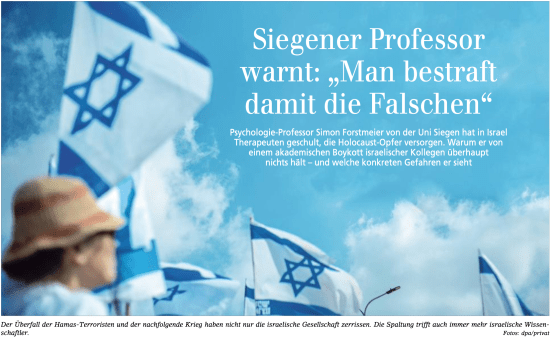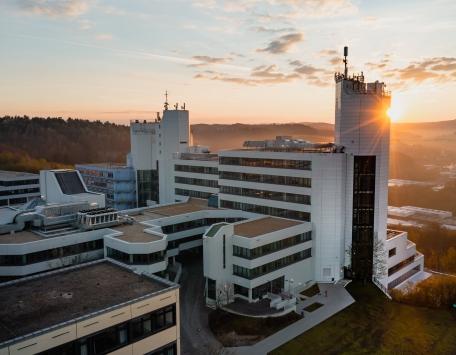Prof. Dr. Simon Forstmeier in an interview with the Siegener Zeitung
Article in the Siegener Zeitung from July 12, 2024
From Andreas Goebel
SIEGEN. A sobering period has begun for Israeli scientists worldwide. According to the Süddeutsche Zeitung, they are being uninvited from conferences, such as the social psychologist Gilad Hirschberger (Reichmann University in Herzliya).
The renowned trauma expert was supposed to open the conference in Oslo in October with his lecture. Then came the email. It said that they regretted having to withdraw the invitation. The Norwegian scientist, with whom he had been in close contact for many years, wrote to him that he had had to bow to the decision of the organizing committee.
They wanted to avoid working with representatives of countries at war.
This is how many people feel. The Israeli newspaper Haaretz recently highlighted 60 such cases, ranging from "ghosting" (simply not getting in touch) to the termination of friendships and the dissolution of collaborations to the removal of Israeli researchers' names from planned publications.
Prof. Dr. Simon Forstmeier from the University of Siegen is traveling to Jerusalem for a congress in the fall (war events permitting). He is also a trauma expert, and his opinion is in demand in Israel. Forstmeier's research focuses on mental health in old age. He and his team have also developed therapies to combat mental illness in older
people. The fact that older people are more likely to suffer from depression has
not been recognized for a long time. Poorly processed traumatic experiences also sometimes resurface in the last stage of life. "In therapy, we look at the life we've lived, and that's what older people do anyway," he says, putting it in a nutshell. "We want to help."
The Israel connection goes back ten years. Back then, he gave a lecture on trauma therapy. He was then introduced to Martin Auerbach, an Israeli with Austrian roots who ran the Amcha organization in Israel, which operates a number of meeting centers and therapy centres for Holocaust victims. Auerbach had listened with interest to Forstmeier's presentation and made him an astonishing suggestion: "You could do your research with us." It was a long road to approval for the research project, reports the 51-year-old, who has been teaching in Siegen since 2014. Funding was finally granted for the period from 2017 to 2022.
Forstmeier was able to appoint a doctoral student on site, repeatedly visited Israel for supervision and trained Israeli therapists. Simon Forstmeier is still impressed by the impartiality and openness of his colleagues. "It was a touching experience for everyone involved that Israeli psychotherapists today want to learn from a German how to better treat their patients, who had to experience so much suffering at the hands of Germans back then." He himself also talks to Holocaust victims. Trauma therapy, he explains the approach, starts with the worst experience that
happened to the person concerned. Some patients are traumatized multiple times. That didn't stick in his craw, he explains. "Even if I remained professional during the sessions." In the evenings, while walking alone through the streets of Tel Aviv, he gave free rein to his feelings.
Forstmeier and his colleagues, in collaboration with their Israeli colleagues, found that even people who have had monstrous experiences can still be treated surprisingly well, even though those affected were on average 82 years old at the time of the study and had experienced multiple traumas.
Old age in particular is a phase in which people mentally return to places and events that have been formative for them. "We remember things more easily in old age, even things that we thought we had under control for decades." But: "People who are old have experienced a lot of stressful things, but have also learned that problems can be solved." Good therapy can help you live your last years well. Simon Forstmeier points out that the Hamas attack on October 7 turned many things upside down and triggered terrible memories, even among those who would not have experienced it themselves
.
And the academic boycott? "Israeli academics are not responsible for politics and, in my opinion, are often critical of the current government," says the psychologist, adding: "You are punishing the wrong people. It is precisely when there is conflict that dialog is called for. Scientific contacts are wonderful ground on the road to peace."
Simon Forstmeier is not alone in this. 10,000 scientists from all over the world have signed an appeal against the academic boycott of Israeli scientists. The open and global academic community is essential in difficult times like these, they say. Simon Forstmeier is already looking forward to the congress in Jerusalem.


